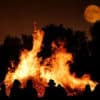by Amanda Gluckich – Milk and Honey Farm – Boulder, CO In this week’s Torah portion, Parshat Ha’Azinu, we learn that the people of Israel, who have been wandering the desert for forty years after leaving Egypt, are about to enter the Holy Land that has been promised to them by God. Moses, who is not allowed to continue into the Holy Land due to previous transgressions, is preparing to sing a song to the people of Israel. The Torah portion, or parsha, is virtually entirely made up of song verses. Moses’s song speaks of the intergenerational tragedies and triumphs of the people of Israel, and even articulates the future to some degree. Moses sings of the people of Israel’s many struggles to accept one God, and of all of the things that God has done for them throughout the generations. Moses’s song brings everyone together and up to speed to explain why they are currently in the place they are in: about to be metaphorically born into the Land of Israel, promised to them by God. Moses begins: “Listen, O heavens, and I will speak! And let the earth hear the words of my mouth!” (Deut. 32:1). When reading […]





